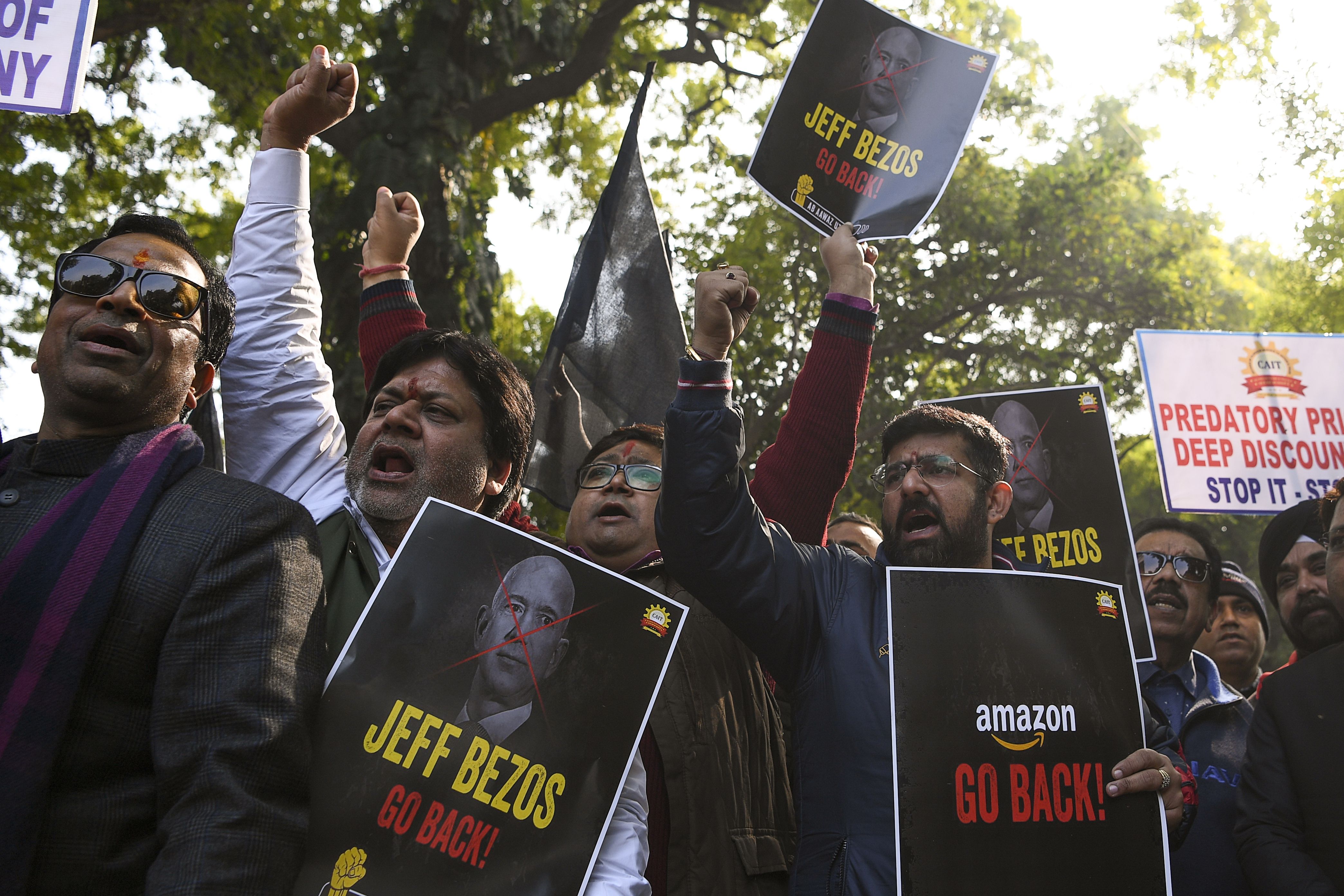During a visit to India in 2014, Amazon chief executive Jeff Bezos made a splashy announcement: His firm was investing $2 billion in the South Asian nation, just a year after beginning operations in the country.
Amazon’s announcement underscored how far India had come to open up to foreign firms. The nation, which had largely kept doors shut to international giants between its independence in 1947 to liberalization in 1991, has slowly transformed itself into the world’s largest open market.
In a televised interview in 2014, Bezos said that there was a perception about India not being an easy place to do business. But Amazon’s growth in the country, he said, was proof that this belief is not accurate.
“Are there obstacles? There are always obstacles. Anywhere you go, every country has its own regulations and rules,” he said.
Six years, and more than $4.5 billion of additional investments later, Amazon today appears to be facing more obstacles than ever in India, the second-largest internet market with more than 600 million users.
Long-standing laws in India have constrained Amazon, which has yet to turn a profit in the country, and other e-commerce firms to not hold inventory or sell items directly to consumers. To bypass this, firms have operated through a maze of joint ventures with local companies that operate as inventory-holding firms.
India got around to fixing this loophole in late 2018 in a move that was widely seen as the biggest blowback to the American firm in the country at the time. Amazon and Walmart-owned Flipkart scrambled to delist hundreds of thousands of items from their stores and made their investments in affiliated firms way more indirect.
Now the nation is set to further toughen this approach. Reuters reported last week that New Delhi is considering making adjustments to some provisions that would prevent affiliated firms to hold even an indirect stake in a seller through their parent.
The Confederation of All India Traders, an Indian trade body that claims to represent over 80 million businesses, told the publication that Indian Commerce Minister Piyush Goyal has assured the organization that it is working to shortly address concerns about alleged violations of current rules.
The forthcoming policy change is only one of the many headaches for the world’s largest e-commerce firm in India.

Offline retailers in India have long expressed concerns about what they allege to be unfair practices employed by Amazon in India. Last year, during Bezos’ visit to the country, they held several protests. (Photo by SAJJAD HUSSAIN/AFP via Getty Images)
Amazon is aggressively fighting a battle to block a deal between its estranged partner Future Group and Reliance Retail, the two largest retail chains in India.
Last year, Future Group announced that it would sell its retail, wholesale, logistics and warehousing businesses to Reliance Retail for $3.4 billion. Amazon, which in 2019 bought stakes in one of Future Group’s unlisted firms, says that the Indian firm has breached its contract (which would have given Amazon the right to first refusal) and engaged in insider trading.
Despite technology giants and investors ploughing more than $20 billion to create an e-commerce market in India in the past decade, online retail still accounts for only a single-digit pie of all retail in the country.
In recent years, Amazon, Walmart and scores of other startups have embraced this realization and sought to work with neighborhood stores that dot tens of thousands of cities, towns and villages in India.
With Reliance Retail and telecom giant Jio Platforms, two subsidiaries of one of India’s largest corporates (Mukesh Ambani’s Reliance Industries) entering the e-commerce market, and receiving the backing of global giants including Facebook and Google last year, cornering a big stake in Future Group is one of the few ways Amazon can accelerate its growth in India.
The American e-commerce firm has had little luck so far in overturning the deal between the Indian firms. Last year, Amazon reached out to Indian antitrust body Competition Commission of India, and market regulator SEBI to block this transaction. Both the bodies have ruled in favor of Future Group and Reliance Retail.
Amazon must have foreseen this outcome because it initiated the legal proceedings at an arbitration court in Singapore. It’s no surprise that the firm chose to also pursue its legal argument outside of India.
Most cases that reach the Singapore International Arbitration Court have come from India in recent years. Vodafone, which has invested more than $20 billion in India, and has been dealt with billions of dollars in unpaid taxes by the country, is another high-profile name to have knocked on the door in Singapore. After losing in India, it emerged victorious in the Singapore arbitration court last year.
Amazon on Monday filed a new petition in Delhi High Court in which it is seeking to enforce SIAC’s ruling (which ordered last year that the deal should be temporarily halted) and prevent the Indian firm from going ahead with the deal based on CCI and SEBI’s judgements.
The company alleges that Future Group “deliberately and maliciously” disobeyed the international arbitration ruling from SIAC. In its petition, Amazon is also seeking detention of Kishore Biyani, the founder and chairman of Future Group.
“Vocal for Local”
As India grappled with containing the spread of the coronavirus last year, India’s Prime Minister Narendra Modi urged the 1.3 billion citizens to make the country “self-reliant” and “be vocal for local.”
The move to turn inwards contrasts with his major promise in the first few years of assuming power in 2014 when he pledged to make India more welcoming to foreign firms than before. In recent years, India has proposed or enforced several regulations that hurt American firms, though none appear to suffer as much as Amazon.
Last year, New Delhi started to enforce a 2% tax on all foreign billings for digital services provided in the country. The U.S. Trade Representative said earlier this month that India was taxing numerous categories of digital services that are “not leviable under other digital services taxes adopted around the world.”
The aggregate tax bill for U.S. companies could exceed $30 million per year in India, USTR’s investigation found. In conclusion, it found India’s digital tax move to be inconsistent with international tax principles, unreasonable and burdening or restricting U.S. commerce.
Modi’s new way of life for India will be music to the ears of Mukesh Ambani, the chairman of Reliance Industries, an ally of the prime minister and India’s richest man.
Before selling stakes worth over $20 billion in Jio Platforms and more than $6 billion in Reliance Retail to marquee foreign investors, Ambani famously made a speech in 2019 in which he urged the need to protect Indians’ data in patriotic terms.
“We have to collectively launch a new movement against data colonization. For India to succeed in this data-driven revolution, we will have to migrate the control and ownership of Indian data back to India — in other words, Indian wealth back to every Indian,” he said.
Why so many international firms have invested in one of Reliance’s properties remains a big question. A senior executive at an American firm told TechCrunch on the condition of anonymity (out of fear of retribution) that the investments in Jio Platforms, which is India’s largest telecom network with nearly 410 million subscribers, and Reliance Retail is a déjà vu moment for the nation, where a few decades ago one of the only ways to do business in the nation was to partner with a local firm with massive political clout.
In a series of tweets, Raman Chima, a former policy executive at Google and who now works at nonprofit digital advocacy group Access Now, alleged that the Android-maker had weighed in 2011-12 partnering and investing in a firm like Reliance to “turn-the-page on Indian political risks.”
The idea prompted concerns about Google’s values, he claimed. “More than one executive involved in those discussions flagged concerns around Reliance’s reputation, particularly around problematic approaches towards gaining influence with policymaking civil servants and politicians, money, ethics in govt-business relationships.”
Amazon itself was rumored to be interested in getting a multi-billion-dollar stake in Reliance Retail last year, but it appears the two firms have stopped engaging on any matter.

BJP MLA Ram Kadam and his party workers protest against the Amazon Prime web series Tandav outside Bandra-Kurla Police station, on January 18, 2021 in Mumbai, India. (Photo by Pratik Chorge/Hindustan Times via Getty Images)
While Amazon sorts out these issues, last week delivered another blow to the firm. A senior executive with the firm as well as Indian makers of a mini-series for Amazon Prime Video are under threat of criminal prosecution in the country after Modi’s ruling party deemed the show offensive to the country’s Hindu majority.
A Hindu nationalist group, politicians with the ruling Bharatiya Janata Party, and a BJP group representing members of India’s lower castes, were among those who had filed police reports against the nine-part mini-series “Tandav” and Amazon. The company bowed to the pressure and edited out some scenes.
“The true reason for the complaints against ‘Tandav’ may be that the show holds up a mirror uncomfortably close to Indian society and some of the problems blamed on Mr. Modi’s administration. In the opening episode, the show features protesting students and disgruntled farmers, echoing events that have taken place in recent months,” The New York Times wrote.
“Mirzapur,” another show of Amazon, also attracted a criminal complaint in India last week for hurting religious and regional sentiments and defaming the Indian town. The Indian Supreme Court has issued notices to the makers of “Mirzapur” and has sought responses.
In the aforementioned interview, Bezos said Amazon’s job was to follow all the unique rules various countries require it to comply with and “adapt our business practice to those rules.”
In India, the company is increasingly being asked how far it is willing to adapt its business practice. How far is it willing to bend that it’s no longer the Amazon people cared for.
Powered by WPeMatico






